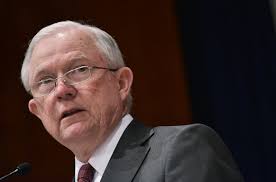Sessions questioned in Russia probe as FBI accused of bias

US attorney general Jeff Sessions was named Tuesday as the first member of Donald Trump's cabinet to be questioned in the probe into allegations of Russian election meddling, as a report said the president himself could face an interview request within weeks.
The Justice Department confirmed that Sessions — who has downplayed the notion that Russia interfered in Trump's favour in 2016 — was heard for several hours last week, suggesting that special counsel Robert Mueller's probe was moving ever close to the president.
But Mueller's probe also came under fierce attack Tuesday after the Justice Department admitted the loss of five months of text messages between two FBI investigators, agent Peter Strzok and lawyer Lisa Page, who are known to have expressed hostility towards Trump.
The loss of the private messages has sparked accusations of a Watergate-like cover-up from Republicans, who claim that Mueller's probe is biased against the president.
Trump himself weighed in Tuesday about the issue.
"In one of the biggest stories in a long time, the FBI now says it is missing five months worth of lovers Strzok-Page texts, perhaps 50,000, and all in prime time. Wow!"
Sessions questioned
Mueller, a former FBI director, has already issued indictments for several former Trump aides, and his interview of Sessions could signal he is getting closer to the president.
The Washington Post reported Tuesday that Mueller wants to question Trump in the "coming weeks" over the 2017 firings of his national security adviser Michael Flynn and FBI director James Comey, as part of the probe which also looking into the possibility that Trump obstructed justice.
What Sessions told Mueller could be crucial in the investigation. As a senior campaign official he had several interactions with Russia's former ambassador in Washington. He also oversaw the campaign's team of foreign policy advisers, including George Papadopoulos, who had extensive Russian contacts and was the first person indicted in Mueller's probe.
Moreover, Sessions played a key role in the May 9, 2017 firing of FBI director James Comey, whose pursuit of the Russia meddling case angered Trump.
Asked Tuesday about Sessions being questioned, Trump said he wasn't worried.
"I'm not at all concerned. Not at all," he said.
Agent texts 'extremely troubling' -
Faced with the pressure on Trump, the Strzok-Page texts have given Republicans a wedge to try and undermine Mueller's overall credibility.
The catalogue of some 50,000 texts show the two, who were having an affair while taking part in the FBI's 2016 investigation of Trump's Democratic election rival Hillary Clinton, repeatedly expressing political preference for Clinton and disdain for Trump.
That investigation, into Clinton's misuse of a private email server while she was secretary of state, ended when Comey decided there was not enough evidence to charge her, raising howls from Republicans of bias.
Then in June 2017, Strzok was named a top investigator in Mueller's probe of possible Trump campaign collusion with Russians. Mueller dismissed him two months later, after the affair and text messages came to his attention.
But Republicans have continued to seize on the text messages as evidence of bias in the Justice Department and FBI.
"We know that Strzok and Page had an intense anti-Trump bias," Congressman John Ratcliffe told Fox News Monday, citing indications that in the "aftermath of his election, there may have been a 'secret society' of folks within the Department of Justice and the FBI, to include Page and Strzok, that would be working against him."
Some alleged a cover-up when the department admitted Monday that the FBI had lost Strzok-Page text messages between December 14, 2016 and May 17, 2017 — a crucial period for the Russia collusion probe -- due to technical issues.
In a statement, senior House Republicans called the thousands of text messages they did receive "extremely troubling."
"Rather than clearing up prior FBI and DOJ actions, these recently produced documents cause us to further question the credibility and objectivity of certain officials at the FBI."
But House Democrats lashed back.
"Republicans are now attacking the FBI in order to undermine Special Counsel Mueller and protect President Trump," Jerrold Nadler and two other senior Democrats said.
"These Republican attacks show their desperation at the fact that Mueller already has obtained two guilty pleas, two indictments, and at least two cooperating witnesses," they said in a statement.
